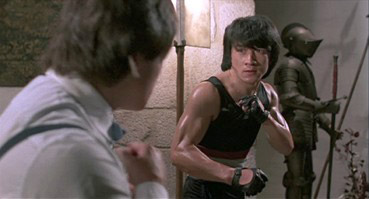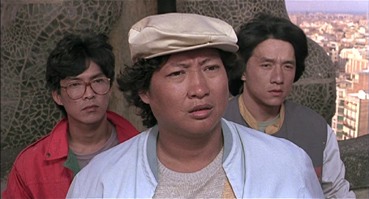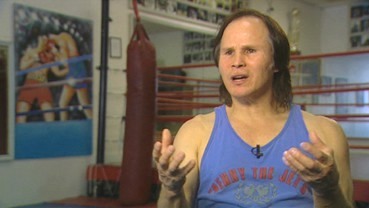|
OK,
Wheels on Meals is a silly and ultimately
meaningless title, a semi-spoonerist switching of words
prompted by a superstition about titles starting with the
letter M (you'll need to listen to Bey Logan's commentary
to get the full story). That said, the literal translation of
the Chinese title – 'Fast Food Car' – is not a lot better.
But if ever there was a case for not judging a book by its
cover – or rather a film by it's title – then this is it,
as in the realms of kung-fu comedies, Wheels on Meals is an absolute winner.
And so it should be, given that it stars Jackie Chan, Sammo Hung and Yuen Biao, three
of the most athletic and charismatic talents in the genre.
It's also directed by Hung, a master of staging action for
the camera and a dab hand at the gags. And as the key heavy
we have Benny "The Jet" Urquidez, undefeated full
contact karate champion and a screen fighter with the necessary
skill and physicality to provide a very convincing challenge
to Chan (that's him as the hard-kicking assassin who attacks John Cusack in Grosse Point Blank – he was also Cusack's kick-boxing instructor). That the film showcases the talents of all of these
players at something like the top of their game should be
recommendation enough. Hell, what am I saying? If you're
a genre fan you already know all this. But if you've discovered
Chan via his later films and are new to this one, then you're
in for a treat.
Generically
speaking, the film has a few surprises. That Chan and Biao
play mobile food vendors and Hung a wannabe private detective
will not raise many eyebrows, but that they do so in Barcelona
rather than Hong Kong marks a definite departure from the
norm and provides a refreshing change of scenery. The plot
may be on the slender side – catering cousins Thomas (Chan)
and David (Biao) fall in with beautiful pickpocket Sylvia
(former Miss Spain, Lola Former), who is being sought by
private eye Moby (Hung) for a wealthy client and by dastardly
Mondale (Pepe Sancho) and his men in an effort to prevent her claiming
her inheritance – but at least does not feel like the padding
between the action scenes. The comedy is rarely as broad
as the genre norm and is sometimes rather smart – an opening
gag involving bedroom doors, which I won't spoil for newcomers,
is funny precisely because of its almost offhand delivery,
and the scene in which the plump Hung goes looking for 'The
Fat Man' in a bar full of jovial fat men is a delight. Indeed,
character interplay provides some of the film's most offbeat
comedy moments, a personal favourite being the asylum inmate who suggests a
logical solution to the problem of Thomas and David's lost
wheel nuts – when subsequently questioned why he is incarcerated he
patiently explains that "madness and stupidity are
two different issues – do you understand, stupid?"

That
none of this drags is due in no small part to breezy performances
across the board, with even the smallest bit part nicely
played without calling to the gallery. Even
the leads tend to keep their more expressive emotions in check, although Biao gets his moment when
some bad news sends him hurling to the ground to beat it with
his fists and wail in despair. Excellent use is also made
of the Spanish locations, with Hung the director seemingly
liberated by his access to so many attractive exteriors
and a sizeable cast of extras, making Wheels on
Meals one of the most visually appealing kung-fu
films of its day.
Initially
the action appears in short, sharp bursts, with expectations
rewarded – the bikers who disrupt the market square and
are spectacularly dismounted by Chan and Biao – but still
played with one eye on the comically unexpected, with the bikers' leader whining that his mum won't allow him to fight and
sent on his way with a reprimanding slap. Usually, though,
it's Sammo who gets the short end of the stick, falling
through a shop awning that the others have bounced off,
and tumbling out of a van and down a steep hillside after
the crew have outmanoeuvred their pursuers.
You
know it's all building to something, and with Thomas, David
and Moby now a sort of ramshackle Three Musketeers, their
three-pronged assault on Mondale's castle hideout provides
climactic fights that allow Chan, Biao and Hung to really
show off their individual skills. The centrepiece has to
be Chan's battle with Urquidez, a ferociously choreographed
demonstration of the speed, agility and fighting skills
of both men that is played largely straight, leaving the
comic action to a sword-fighting Hung and a furniture-leaping
Biao. It's a stonking three-way finale, with Hung once again
proving that he can choreograph action to camera better
than just about anyone, as well as bring out the very best
in the fighting skills of his leads.
Wheels
on Meals is, as Bey Logan says on the commentary,
a blast, an enormously likeable comedy actioner that balances
these two elements effortlessly, right up to and including
the superbly staged final battles. It has a great cast,
great direction, great fights and is great fun. What are
you waiting for?
Hong
Kong legends keep on getting it right and once again have
delivered a first rate transfer, capturing the colours of
the Spanish locations and Sammo's sometimes fashion-victim
clothing very nicely, and exhibiting very good sharpness
and contrast levels. As ever, the print is virtually spotless.

There
are three soundtracks available, Cantonese 5.1, English
5.1 and the original Cantonese mono 2.0 track. The Cantonese
5.1 is nowhere near as lively as he remix on HKL's Knockabout
DVD, though the rear speakers really kick in when the motorbikes
start racing about the market square. It's only when you
switch to the original mono track that you really appreciate
the qualities of the 5.1 – the mono original is a lot harsher,
with minor distortion in the louder dialogue. The English
dub provides the usual amusements, especially if run alongside
the subtitles.
The
Commentary by Bey Logan provides
the usual plethora of information on the cast and crew,
plus a guide to the architecture of the great Antoni Gaudi,
whose work is featured prominently in the film, and
some comments on the fashion choices of Sammo and his co-stars.
Once again this is essential listening for anyone interested
in the film and especially the stars and director.
The
rest of the extras are on disk 2.
The
Interview Gallery has 4 entries.
In On Giant's Shoulders (7:41)
director/star Sammo Hung recalls the shoot, the on-location
language difficulties, working with car and bike stunt coordinator
Blacky Ko (who died two years ago), the choice of Benny
Urquidez as a foil for Jackie, and his own character in
the film. The interview is in Chinese with English subtitles,
and as with all of the interviews is anamorphic widescreen.
In
Born to Fight (14:57) co-star
Yuen Biao traces his history with long-term friends and
collaborators Sammo and Jackie and explains how they all
got into action movies. He outlines the plot of Wheels
on Meals in case you missed it, and talks about
learning to ride skateboards for the film, the difficulty
most of the actors had with the fencing scenes, and the
stunt work during the car chase. Asked about a future project
that would re-unite the three friends, he suggests that
such a venture would have to feature their sons, as the
three are too old for such action work now. This is in Chinese
with English subtitles.
Rush
and Roll (18:39) is an interview with Rush
Hour director Brett Ratner, who talks about how
he got into the film business, his introduction to Jackie
Chan and the making of the two Rush Hour
films, as well as the threat of a third. To be honest I'm
not sure what this interview is doing on the disc – the
Jackie Chan connection aside, it has nothing whatsoever
to do with Wheels on Meals and is frankly
a bit self-congratulatory and not that interesting. A tiresome
attempt to visually enliven the interview intermittently
splits the screen in two and places the same footage on
both sides, with one of them enlarged and in black-and-white.
In
The Inside Track (34:44) Stanley
Tong, a friend and collaborator with Sammo and Jackie, (he
directed Chan in Rumble in the Bronx, Police
Story 3, Police Story 4 and First
Strike) talks about his own journey through the
Hong Kong film industry, from stunt man to director, a trip
that involved a fair few injuries, and stunt doubling for
women because of his then slender build. Though also not
directly connected to the film, this is a lot more interesting
than the interview with Ratner, and Tong nicely counters
Ratner's admission that most of the Rush Hour
action sequences were adapted from similar scenes in Jackie's
Asian films by stating categorically that when directing
Jackie a golden rule is that you should never repeat something
he has done before. This also has those annoying 2-screen
bits.

The
next section, Fight Club, has
two bloody good interviews.
Jet Fighter (28:25) talks to with Benny "The Jet" Urquidez
at his gym, where he explains his teaching methods, his
philosophy of life and love – "if you can't do it for
love, it won't last long" – his history with martial
arts (he is an undefeated kickboxing champion, with 63 successful
title defences, 57 of which resulted in knockouts), how
he got into movies and his work with Jackie Chan on both Wheels on Meals and Dragons Forever.
An extraordinarily energetic and upbeat interviewee, he
clearly loved working on the films and hanging out with
Chan, Hung, Biao and fellow bad guy actor Keith Vitali.
Which brings us neatly to...
King
of the Ring (33:24) is an interview with Keith
Vitali, who plays Thug Number 2 opposite Urquidez and does
battle with Biao at the film's climax. He recalls his time
working on the film with great fondness and retains a huge
admiration for its three stars, whom he admits to having
learned a great deal from. He provides a lot of detail
on the filming of specific scenes, and to this day remains
humbled and thrilled by this experience. This is an enormously
enjoyable and informative inclusion.
The
Cutting Room Floor has two sets of Out-Takes
(2:53 and 0:54), familiar end credit accompaniments on Chan's
film but not on this one, at least not on most prints –
apparently they were included on the Japanese release (Chan's
fan base in Japan at the time was one of the biggest in
the world), and in lieu of that print we have what I presume
were the outtakes used. They are quite fun, though not as
spectacular as those in Chan's later works, and include
shots not used in the final cut of the film.
The
Trailer Gallery has the UK
Promotional Trailer (1:41), which is an ad
for this very DVD, and the Original Theatrical
Trailer (3:59). Both are anamorphic widescreen
and in very good condition.
Wheels
on Meals is a terrific blend of comedy and kung-fu
that stays loyal to both concerns throughout. It marked
a step forward for the genre in several respects, from its
Spanish locations to its multi-racial cast and even cross-culture
romances, but its still-present freshness is down to the
talents of its director and stars, who deliver a string
of solid action sequences that climax in a fight that has
already earned its place as one of the genre's best.
Hong
Kong Legends have done the film proud, with a fine transfer,
a typically excellent Bey Logan commentary and a collection
of (mostly) interesting interviews on the second disk. If
you're a Jackie Chan or Sammo Hung fan you'll already have
the disc on order, and if not you should have. If you've
yet to discover just why these two men are held in such
high regard within the genre then this is as good an introduction
as you'll find. Highly recommended.
|